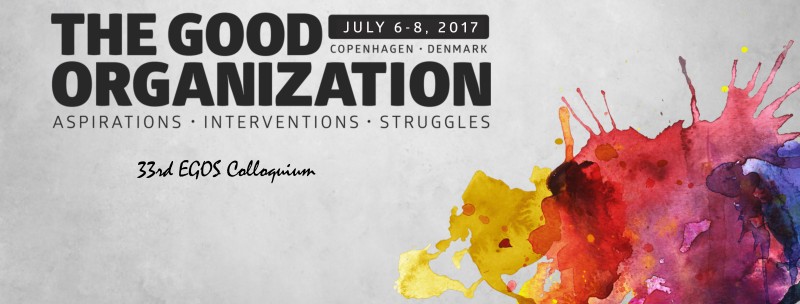Sub-theme 19: Organizations and Organizing in a Welfare State Context
Call for Papers
Exploring current and future welfare state challenges is not only of interest to Nordic scholars, but relevant in a broader
international perspective where the balancing of liberal and social ideas form contemporary policy debates and reforms. Also
the recent ideas on social and public value creation (Benington & Moore, 2011), the expansion of public-private partnerships
(Mörth & Sahlin-Andersson, 2006), the whole-of-government and civil society networks (Christensen & Laegreid, 2007),
the public sector digitization (Fountain, 2004), etc. add to the relevance of exploring questions on the forming of “good
and appropriate organizations” in a welfare state context.
In this sub-theme we wish to revisit the ideas
developed as part of the distinctive research tradition labelled “Scandinavian institutionalism” (Byrkjeflot et al., 2013;
Czarniawska & Sevón, 2005; Czarniawska & Sevón, 1996). This research tradition is clearly inspired by the early institutional
arguments about the spread of rational and formal organizational structures (Meyer & Rowan, 1977). The Nordic scholars,
however, started during the 1980s to address institutional dynamics from a different point of view; they were interested in
how pressures on organizations – such as public reforms and new management ideas – brought about variation and distinctiveness
at the micro-level. This gave rise to a research tradition that displays “a preference for intensive rich, process-oriented,
and qualitative approaches to the study of organization” (Boxenbaum & Strandgaard Pedersen, 2009, p. 196). Notions such
as the garbage can model (Cohen et al., 1972), translation (Czarniawska & Sevón, 1996), editing (Sahlin-Andersson, 1996),
hypocrisy (Brunsson, 2003), recipes (Christensen et al., 2007), and fashion (Abrahamson, 1996) were all central theoretical
developments. In terms of methods, qualitative and context sensitive case studies reigned and these addressed often, but not
exclusively, public sector organizations.
Recently, we notice an interest in organizational studies to include
Scandinavian institutionalism concepts such as such as translation (Wæraas & Agger Nielsen, 2016), and theorizations about
the local context’s importance and linkages to a global context (Drori et al., 2013). This makes it timely to discuss how
and why the Scandinavian institutionalism approach may still be relevant and what makes this research approach distinct. The
sub-theme will be structured into topic oriented paper sessions as well as formed around shared discussions with invited guests
representing the early foundations of this research tradition.
In revisiting the Scandinavian institutionalism
we encourage empirically and theoretically rich papers that focus on alternative aspects of organizing, and where questions
concerning ideas and ideals of the “welfare state” are put at the centre of analysis. Papers may – but are not limited to
– address the following topics:
- Organizations and organizing of “good” under different regimes – the state, the market and civil society
- The creation, translation and impact of institutions, logics, and models constituting ”good organizations” across societies and contexts, and their local distinction and variation
- Intra-organizational responses to institutional complexity
- Decision-making processes, negotiations and politics
- Social interaction, sense-making, and interpretive processes
- Micro-foundations of institutions; micro-level agency and practices
- Materialization of institutions and logics
- Contributions that largely follow the research agenda of Scandinavian institutionalism, but explicate alternative interpretative frameworks for understanding “good and appropriate” organizing from related epistemic traditions and conceptual developments
References
- Abrahamson, E. (1996): “Management Fashion.” The Academy of Management Review, 21 (1), 254–285.
- Benington, J., & Moore, M.H. (2011): Public Value. Theory and Practice. Basingstoke, UK: Palgrave Macmillan.
- Boxenbaum, E., & Strandgaard Pedersen, J. (2009): “Scandinavian institutionalism – a case of institutional work.” In: T.B. Lawrence, R. Suddaby & B. Leca (eds.): Institutional Work: Actors and Agency in Institutional Studies of Organization. Cambridge: Cambridge University Press, 178–204.
- Brunsson, N. (2003): “Organized Hypocrisy.” In: B. Czarniawska & G. Sevón (eds.): The Northern Lights: Organization Theory in Scandinavia. Malmö: Liber, 201–222.
- Byrkjeflot, H., Pedersen, J.S., & Svejenova, S. (2013): “From label to practice: The process of creating new nordic cuisine.” Journal of Culinary Science & Technology, 11 (1), 36–55.
- Christensen, T., & Laegreid, P. (2007): Transcending in Public Management. The Transformation of Public Sector Reforms. Aldershot: Ashgate Publishing Limited.
- Christensen, T., Lægreid, P., Roness, P.G., & Røvik, K.A. (2007): Organization Theory and the Public Sector: Instrument, Culture and Myth. London: Routledge.
- Cohen, M.D., March, J.G., & Olsen, J.P. (1972): “A Garbage Can Model of Organizational Choice.” Administrative Science Quarterly, 17 (1), 1–25.
- Czarniawska, B., & Sevón, G. (2005): Global Ideas: How Ideas, Objects and Practices Travel in the Global Economy. Malmö: Liber.
- Czarniawska, B., & Sevón, G. (eds.) (1996): Translating Organizational Change. Berlin: Walter de Gruyter.
- Drori, G.S., Höllerer, M.A., & Walgenbach, P. (2013): Global Themes and Local Variations in Organizations and Management. Perspectives on Glocalization. New York: Routledge.
- Fountain, J.E. (2004): Building the Virtual State: Information Technology and Institutional Change. Washington, D.C.: Brookings Institution Press.
- Meyer, J.W., & Rowan, B. (1977): “Institutionalized Organizations: Formal Structure as Myth and Ceremony.” American Journal of Sociology, 83 (2), 340–363.
- Mörth, U., & Sahlin-Andersson, K. (2006): Privatoffentliga partnerskap. Styrning utan hierarkier och tvång. Stockholm: SNS.
- Sahlin-Andersson, K. (1996): “Imitating by Editing Success: The Construction of Organizational Fields.” In: B. Czarniawska & G. Sevón (eds.): Translating Organizational Change. Berlin: Walter de Gruyter, 69–92.
- Wæraas,
A., & Agger Nielsen, J. (2016): “Translation Theory ‘Translated’: Three Perspectives on Translation in Organizational
Research.” International Journal of Management Reviews, 18 (3), 236–270.


